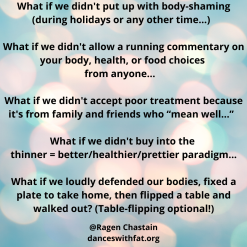Repost: Some “What Ifs” For Dealing With Fatphobia In The New Year
This blog post was written by Ragen Chastain of Dances with Fat.
“The truth is that fatphobia should never happen, and we should never have to deal with it. If and when we do, we might have to take into account how much energy we have to fight, how much power the person engaged in bigotry has over us, or other factors – including and especially for people who are part of more than one marginalized community. So these what-ifs aren’t about deciding what we will do every time, but rather thinking about the possibilities
What if we didn’t put up with body shaming?
What if we interrupted body shaming whenever we heard it – not just about our own bodies, but about any body? You could say something like “My new year’s resolution is to stop participating in negative body talk.” (If this is happening before the new year, just add “and I’m starting early!”)
What if we didn’t allow a running commentary on our body/food choices/weight/etc.
People can think whatever they want about my body, but they can’t say it out loud if they want me to stick around. One of my favorite phrases for this is “I’m going to stop you there.” You can just leave it at that and change the subject, or you can add something like “I’m not interested in people’s opinions about my body/food/weight/etc. let’s talk about something else.”
What if we didn’t buy into the thinner=better/healthier/prettier paradigm
This is a place where I think all of us can probably use some self-work. Our culture is utterly saturated with this myth and it can create fatphobia that is directed at others and/or internalized. (Often we can identify areas for work by our “buts” and our “as long as’s” for example, if we think “it’s ok to be fat but…she shouldn’t be wearing that” or “it’s ok to be fat as long as you’re healthy”) Bodies come in lots of sizes for lots of reasons and thinner bodies are not inherently better in any way, and adding healthism to fatphobia does not improve the situation.
What if we loudly defended our bodies, fixed a plate, then flipped a table and walked out?
This may not be your style and that’s completely ok. But know that it’s ok to defend your body (maybe like you would defend someone you love.) We each get to choose what we are going to allow and sometimes those choices are out of your hands, but it’s worth brainstorming the solutions that are the most “out there” including table-flipping, and leaving (with a plate, of course!)
If we want to dismantle fatphobia we need to keep asking ‘what if…’.”

